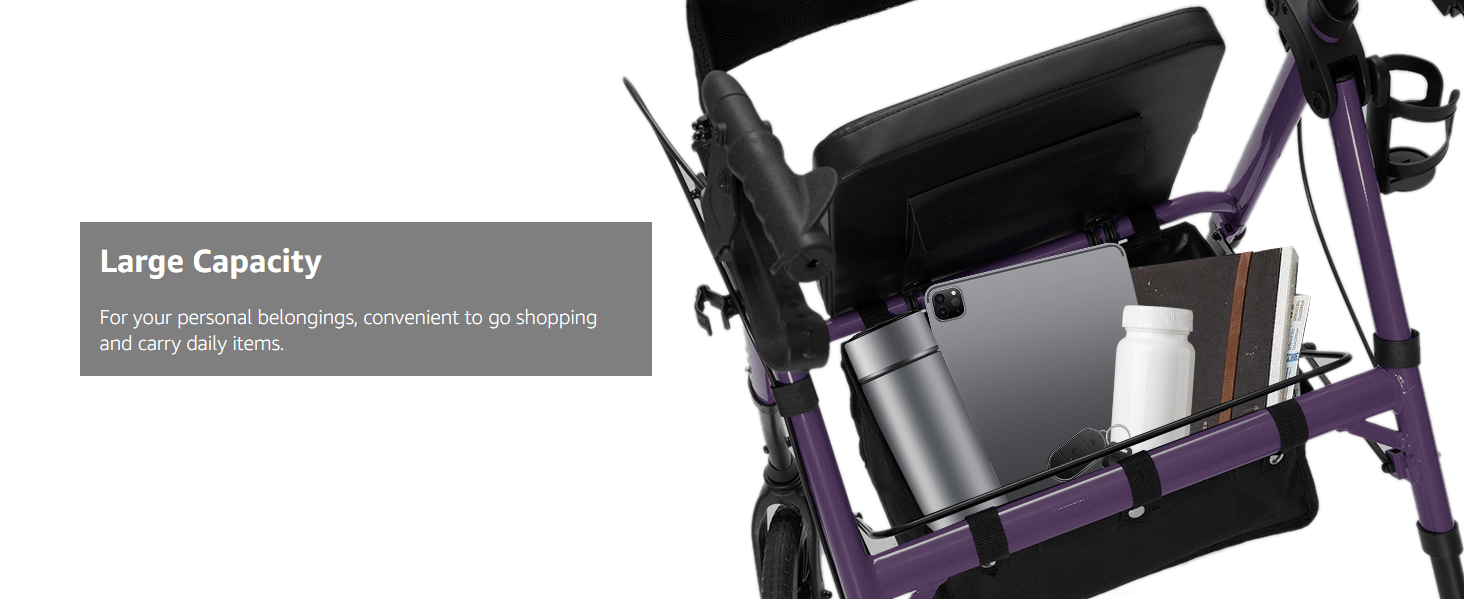Are Rollator Walkers Suitable for People with Dementia?
May 05, 2025
When someone you love is living with dementia, every little decision—big or small—feels like it matters. One of those decisions often comes down to mobility: how do we help them move around safely and comfortably? That’s where rollator walkers come into the conversation.

But are rollator walkers really suitable for people with dementia? The answer isn’t a simple yes or no—it’s more of a “depends on the situation.”
What exactly is a rollator walker?
A rollator walker, also known as a rolling walker or wheeled walker, is basically a walker with wheels—usually four of them. Most also come with brakes, a seat, and a little basket or pouch for carrying personal items. Some even have backrests so users can sit down and rest when needed. These are often referred to as walkers with seats or walkers with wheels.
Unlike traditional walkers, which have to be lifted slightly with each step, a rollator glides along with you. Sounds convenient, right? It is—for the right person.
So… are they a good choice for people with dementia?
That depends on a few things, mainly:
1. What stage of dementia the person is in
2. Their physical strength and coordination
3. How much supervision or support they have

When Rollator Walkers Can Work Well
If the person with dementia is still in the early or middle stages and they’re relatively mobile, a walker with wheels can be super helpful. Here’s why:
1. They help with balance and stability
Many people with dementia also have mobility challenges. A rolling walker can help keep them steady on their feet and reduce the risk of falling.
2. They encourage independence
If your loved one is still capable of moving around the house or garden, a rollator gives them more freedom without relying on someone else 24/7. They can get up, grab a snack, or stroll to the bathroom on their own (with proper safety in place, of course).

ELENKER KLD-9218-10 All-Terrain Rollator Walker with 10" Purple
3. Built-in seat = built-in rest stop
One of the best things about rollator walkers is that walkers with seats give the person a place to rest whenever they need to. This is huge for someone who tires easily or gets overwhelmed.
4. Storage can help reduce confusion
Some walkers come with little bags or baskets where users can keep familiar items—a water bottle, tissues, or even a comfort object. This can reduce stress and confusion throughout the day.
But When Might They Not Be a Good Fit?
As dementia progresses, things can get more complicated. A rolling walker might not be the best option if:
1. The person forgets how to use it properly
If your loved one doesn’t remember how to use the brakes or forgets the purpose of the walker entirely, it can actually become a safety hazard.
2. They struggle with judgment or attention
People with dementia may not notice obstacles in their path or might try to sit down without locking the brakes, which can lead to falls.
3. They wander frequently
A rollator walker can make it easier for someone to move around... maybe a little too easily. If wandering is an issue, it’s worth thinking about safety boundaries, alarms, or supervision.
4. They don’t have the strength or coordination
Braking, steering, and balancing while using a wheeled walker does take some muscle control and focus. If someone is too weak or has poor coordination, a traditional walker (no wheels) or caregiver support might be safer.
What to Look For If You Do Choose a Rollator
If you and your care team decide a rollator walker is a good fit for your loved one with dementia, here are a few features to look for:
Easy-to-use brakes – especially ones that lock when sitting

ELENKER KLD-9218-10 All-Terrain Rollator Walker with dual braking system
Comfortable seat – padded and sturdy, for frequent rests

ELENKER KLD-9218-10 All-Terrain Rollator Walker with padded seat and backrest
Lightweight frame – so it’s easier to manage indoors and in tight spaces
Bag or storage space – for comfort items or essentials

ELENKER KLD-9218-10 All-Terrain Rollator Walker with large storage space
Adjustable height – to make sure it fits the user just right

ELENKER KLD-9218-10 All-Terrain Rollator Walker with adjust frame
Bonus points if the walker comes in a color or style your loved one finds familiar or comforting!
Safety Tips for Using a Wheeled Walker with Dementia
Even with the best walker on the market, a little planning goes a long way. Here are some tips to keep things safe and smooth:
Practice together – Take time to help them get used to the walker in a calm, quiet space.
Supervise when needed – Especially during transitions, like getting up from a chair or using the bathroom.
Use clear paths at home – Keep walkways free of clutter, rugs, and cords.
Label or mark the walker – If the person is in a facility or shared living space, having their name or a familiar symbol on the walker can help with recognition.
Set boundaries – If wandering is an issue, use door alarms or gates to prevent unsafe wandering outside.
So, are rollator walkers suitable for people with dementia?
Yes—but with conditions.
For some folks, especially those in earlier stages of dementia who still have good mobility, a rolling walker can make life a lot easier. It gives them support, comfort, and a bit more freedom. But for others—especially as dementia progresses—a wheeled walker might be more confusing or even dangerous without the right supervision.
It really comes down to knowing your loved one. Their habits, their memory, their physical strength—all of it matters. When in doubt, talk to a doctor, occupational therapist, or physical therapist. They’ll help you figure out what type of mobility aid is safest and most helpful at this stage of life.
At the end of the day, the goal is to keep your loved one safe, comfortable, and as independent as possible. Whether that means a rollator walker or something else entirely, you’ve got options—and you’re not alone.











